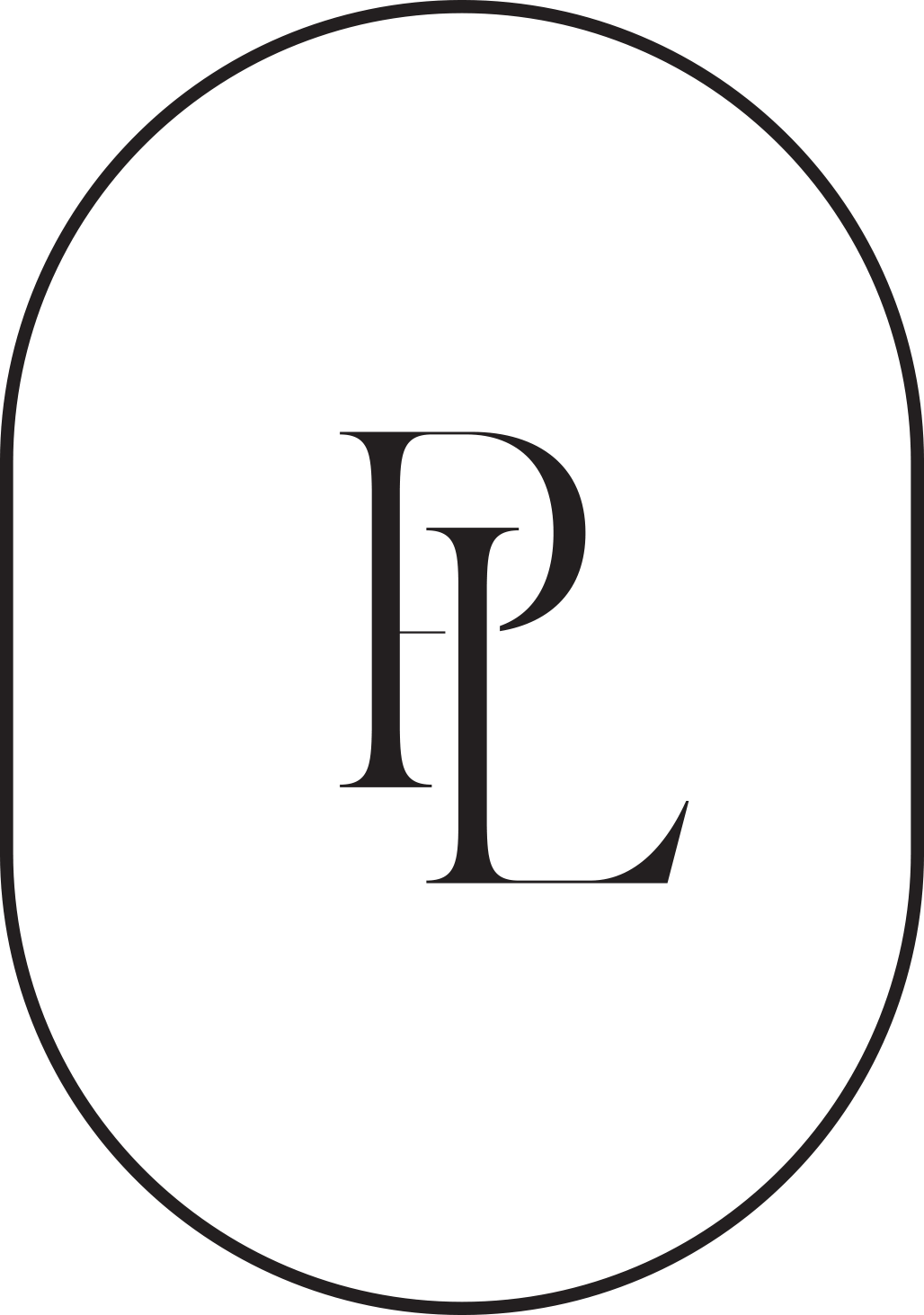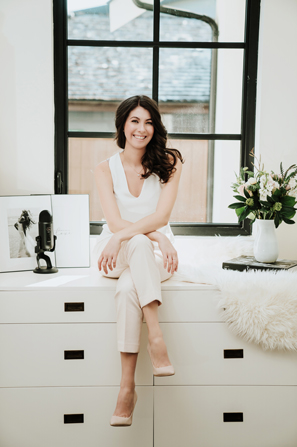Hello World!
I am so excited to share with you our next spotlight feature – Lindsay Pleskot, Registered Dietician! I was on the search for some time trying to find the right dietician; searching through websites, Instragram and Facebook pages to feature one that really resonated with me and who I felt would share the right message about nutrition with you all. I came across Lindsay’s website, and then spend quite a bit of time going through her feed and watching her video clips. I had a gut feeling right off the bat that she was the best choice for my spotlight series – and boy was I right. You know you found someone who is truly passionate and knowledgeable about their professional when a 20 min interview turns into 14 pages of content! That being said, this interview will be split into 2 parts. Lindsay is amazing, incredibly personable and has so much to share with you. I can now say that she will be Revue Blanc’s go-to nutritional expert…so let’s get started!
.jpg)
RB: What experience do you have in the nutrition and wellness profession?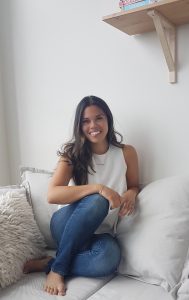
LP: I’m actually from Kamloops so I started at TRU; which is the University in Kamloops. Before you get into the program of being a dietitian you have to first do two years of Sciences; so my first year was spent at TRU and then I ended up transferring to UBC and did an additional two years. I then completed the Dietetics program at UBC, which is the only Dietetics program in BC. The last year of the dietetics program is an internship that you do through a hospital, so I did my internship at St Paul’s in Vancouver. That’s where my career started as I got hired out of the internship. Generally, you start off as a casual covering off other people’s vacation or maternity leaves. I started off working a bit of everywhere; in cystic fibrosis, healthy heart, diabetes and then I ended up getting a position in mental health pretty soon after starting. I worked in mental health for three or four years, which was really interesting!
RB:So that is where I started, then about a year into my work I started working in private practice part time as well.
LP: I then decided I wanted to go the full route of doing private practice, so two years ago I transitioned from working in the Hospital to working in private practice full time and that is when I started branching out and putting more time into my blog and doing other work as well such as: menu and recipe development for restaurants or different companies, and creating recipes and articles for my blog. My blog has a little bit of everything; from written articles, videos, menu and recipe development for myself or others and also the one on one programs with clients.
RB: What is the difference between a dietician and a nutritionist?
LP: To become a dietitian, you must complete the dietetics program which is an accredited University Program involving an undergraduate degree in Science with a major in Dietetics. This involves 2 years of sciences followed by 3 years in the dietetics program, ending with a 1-year internship at a hospital, and finally a licensing board exam. The term dietitian is a legally protected term meaning only those who have completed the above studies may use the title. We are also regulated by a governing body- The College of Dietitians of British Columbia and must complete continuing education each year to be able to maintain our license.
The term nutritionist is not legally protected everywhere which means there are multiple programs that give the title of nutritionist and the level of education can vary. For some it is a one-year course and for others they have completed Master’s degrees. I have worked with some great nutritionists, so the bottom line is to do a bit of research and check out the experience, credentials and fit of any health professional you’re working with then decide based on what works best for you!
RB: Why did you decide to pursue a career in this field?
LP: I’ve always been really interested in Sciences; specifically, Health Sciences. Like a lot of younger kids, I was interested in medicine, I think it’s because that’s what I was more familiar with in terms of a helping health profession. I was always really fascinated by the body, biology and physiology. I played a lot of sports growing up and we actually had a dietitian come in and talk to our soccer team one time which was my first introduction to learning a bit more about food and the role it can play in your body and everything it can do for you.
In grade 12, we had a dietitian from UBC come talk to us and she shared more about the profession. It was really fascinating to me that there was a whole career based around food and nutrition.
There was also some influence from personal experience. I definitely went through a period, like a lot of people do growing up, where I was confused and wasn’t really sure what the true message really was about food and nutrition; almost being fearful of food. I was curious about what food could actually do for us and in looking at it more from a “fueling” and balanced perspective; enjoying it for fuel and nutrition but also for the social aspect, such as bringing together cultures and family and connecting us with different people. So the more I learned about it, I realized that there were so many different opportunities in this field, and it seemed like a really good fit!
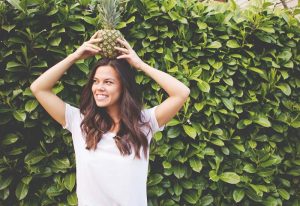 RB:What interests you most about health and nutrition?
RB:What interests you most about health and nutrition?
LP: What interests me most is that there are so many different ways to go about it and you really can individualize and tailor it to each person. There isn’t really 1 formula that’s going to work for everyone. There are all these messages, again, about what’s good or what’s bad and really what it comes down to is the individual. There are definitely certain principles that apply, but really at the end of the day, there are different things that are going to make people feel good. I really like being creative and cooking and creating recipes is probably what I enjoy the most. There is just so much ability to be creative and to bring out so much flavor in food just from natural products like the variety of spices that we have. Even all the different fruits and vegetables and food that we have available to us; there’s so much that you can do and I think finding ways to put those dishes together and really bring out the flavor of food and sort of highlight that and then to be able to really nourish someone and have an impact on everything from their mood, energy, to their health and vitality, their skin, their whole body. Seeing how much nutrition can impact being your best self really- mentally, physically and emotionally really fascinates me.
RB: What has been your greatest professional success and biggest setback?
LP: One of my biggest successes has been creating my meal plan program. I developed it over a long course of time in conjunction with my clients to figure out how to bring that information onto the table – that was definitely a huge challenge and huge success for me in creating that and actually following through and bringing it to life. But I think overall I would say for me what feels like the biggest success is just getting to wake up and do what I love every day and not being scared to take those risks. Learning to listen to what my gut was telling me in regard to what route I was wanting to go. It definitely hasn’t always been easy, but being able to work with people and help them have a good relationship with food and get excited about food whether they’re comfortable in the kitchen or not is my biggest success.
My biggest setback might have been right at the start – I actually didn’t get into the Dietetics program the first time I applied. At the time it was devastating. You can only apply twice so it was so much pressure and I wondered am I ever going to get in? But I was lucky enough at the time to be able to meet with the program director and it came down to just not having enough volunteer experience. That’s a huge part of getting into the program, and so at the time it felt like a huge setback but it really helped me solidify the passion that I had for the profession and push myself to do everything I needed to get in. I think it probably made me appreciate it that much more. It now seems like a distant memory but I always share this with my students – don’t get discouraged if you don’t get in right away. See what you can do to kind of better your experience and better prepare yourself and I think that that has prepared me for different points in my career where things don’t always work out the way that you plan. It has helped me not to see it as a failure but rather as an opportunity to figure out what’s working and what’s not. It has also helped me relate to my clients. If they’re working on making changes and things aren’t going the way that they planned, I always encourage them not to look at that as a failure or setback but actually opportunity to learn more about themselves, grow and figure out why it isn’t working and what they can do to best move forward.
RB: Have you always had a healthy relationship with food?
LP: I would say probably no. I don’t know if it’s something about being a teenager, you’re just getting to know yourself and you don’t really know what makes you happy. You’re learning about what your own values are and it’s like this combination and mesh of what you see in the media, what you hear from other people, what you’re experiencing yourself…just so much is changing and I think for me it came down to really just a lack of knowledge. During the nineties when I was growing up everything was “fat free”, “low calorie”, and “sugar free” – it was all about what you shouldn’t be eating or what you should stay away from. It almost induces this fear in you that food is this scary thing and that you should be focusing on everything that you shouldn’t be eating and avoiding. I definitely went through a period where I was really focused on “everything you eat is going to do something bad to you” but that also kind of sparked that interest in me and I realized this can’t be the right way to approach it. When you’re not nourishing your body properly, you do really feel that in your energy and in your mood and it can become really preoccupying thinking about food all the time. I think ultimately that was a huge factor in leading me towards this career. I really wanted to learn more about what food can do for you and look at it from a more positive perspective.
RB: What is your approach or philosophy when it comes to healthy eating?
LP: My philosophy is really about focusing on what you are eating and what you’re adding into your diet versus what you can’t eat or what you need to cut out. Learning about how can you add more flavor and also benefit more from what you’re eating by adding anti-inflammatory spices like cinnamon or turmeric which add so much flavor and color. It’s not about not eating salt or not having sugar but focusing on what you are adding in that is going to actually give you more flavor and help you enjoy the meal more, as well as, add more benefit to your health. If you are trying to reduce the amount of processed foods or refined sugars and you become focused on that, it ends up being all you can think about! Whereas if you’re focusing on getting more plants on your plate, eating more veggies, adding more flavor into your diet, you’ll naturally end up reducing the amount of the processed and refined foods but without this negative focus. That is one of my approaches, with the other being helping people find balance. I really do advocate for balance. There’s definitely food you should eat more often than others, but it’s important to find that balance and have a positive relationship with food. If you want something – enjoy it but eat it mindfully. And besides that, getting more whole foods on your plate and cooking more from home – you will always benefit from that.
RB: What are your thoughts on dieting?
LP: I am not a fan of dieting. I think just the term dieting signifies that there’s a beginning and an end, it’s something that you’re doing temporarily and it is all about that restriction; what you can’t have, and it can be really guilt inducing. That’s never going to be a positive thing. I think a better way to look at it, as cheesy as it may sound, is a lifestyle change. If you want permanent changes, you’ve got to figure out ways to incorporate lasting change into your diet and the only way to do that is to do it in ways that are going to work for your lifestyle, work for your timeline work for your cooking skills, and your taste preferences. Eating really is mental, physical, and emotional and if you aren’t considering all of them it’s just going to be this uphill battle the whole time.
RB: Are there certain diets that are better than others? (Alkaline, Vegetarian, Vegan, Raw Food, Mediterranean)
LP: It really is individual and the best diet is going to be the diet that works for you. It’s important to keep in mind that not everybody feels the best eating the same way.. There can be different medical conditions, intolerances or allergies that just don’t allow people to feel good or eat certain ways, so I don’t think there’s one diet that’s better than the other. It’s considering all of those things; if you’re just absolutely never going to follow a certain style of eating then it’s really not going to benefit you to battle with it. I think definitely eating more plant-based foods; filling your plate with lots of veggies, nuts and seeds, legumes, those are definitely going to nourish you, but that doesn’t mean you have to be vegan to be a healthy person. I do really like the Mediterranean style of eating with lots of healthy fats, plant foods, protein and grains.
It’s so easy to get pulled in all different directions with a seemingly new fad diet every year, but really it comes down to the basics of eating regularly throughout the day, eating whole foods, filling your plate with lots of veggies and plant foods, having that balance and not being afraid of certain foods.
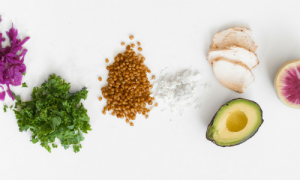
RB: What are your thoughts on the meal prep fad?
LP: I am a big fan of meal prep. My Meal Plan Program, The 3-2-1 Method, is based on a meal prep strategy which has ultimately helped my clients be able to adopt and stick to it, even with the crazy busy lives they lead. At the beginning of the week, you prep 3 different veggies, 2 proteins and 1 grain, and it walks you through how to do that in one hour. What I don’t like about traditional meal prep, and what tends to turn people off is the idea of having to eat the same thing day in and day out. Broccoli, yams and chicken every single day…no wonder it gets boring! But it doesn’t have to be that way.
By prepping a few key ingredients and having other ready to go items on hand to combine them with- spices, bins of greens, tortillas- you can get a completely different 15-minute meal every night.
Like anything else in life, it is usually easier if you have a plan. By investing a bit of time up front, you end up saving so much time and stress throughout the week- and you’ll be eating better! Our lives are so busy these days and as much as we try to plan, our days are not always going to go as planned so having fresh ingredients ready to go can be a lifesaver.
RB: How would a person benefit from seeing a Dietician?
LP: As a start, we are here to provide reliable, trustworthy nutrition information. A lot of the challenges come from just not really knowing the truth about food. There’s so much information out there these days and everyone is willing to give an opinion or proclaim themselves as an expert so it can get really confusing. So helping cut through the confusion and some of the BS and really be there as a coach. It’s not about us sitting there and telling you what’s good or bad. I have clients come in saying “My food record is so bad – don’t judge me!”, but the whole point of us being there is to help educate them and work with them, not sit there and judge them about what they’re eating. Our goal is to help figure out how they want to feel and what changes are going to help them get there in a way that is suitable and sustainable for them emotionally and mentally as well. There’s so much behind that relationship with food. We’re there to help support people, help them gain a healthy relationship with food, as well as, educate and do the planning that will help them get from point A to B and develop a lifelong healthy relationship with food.
RB: What would you suggest to someone who is wanting to get health or lose weight before a big event, like a wedding specifically (especially during that exercise intense time)?
LP: There can definitely be that pressure to look and feel your best on your wedding day. I’d say the biggest thing is being consistent so that you don’t end up feeling like you have to crash diet or that you have to restrict. That will leave you feeling miserable, and not able to enjoy all of the events leading up. You definitely don’t want to end up on your wedding day feeling awful.
If you are increasing your workouts, you may want to consider increasing protein a bit. This can be beans, lentils, tofu, chicken, fish – there are so many options to choose from! Filling half of your plate with veggies is another great goal to aim for. There’s a plate model that’s really easy; a starting point for people to refer to which is half a plate of veggies, quarter plate of protein, quarter plate of starch with a bit of healthy fats for your cooking or as a garnish. I find sometimes when people are working out more, complex carbs are also helpful like rice, quinoa, or yams – that’s actually the fuel for your muscles so you do need some of that. I find often when people completely cut out the carbs they actually end up craving sugar because they don’t have those slow digesting sugars that we use for energy. Everyone’s a little different; I have clients that feel best when they’re eating more protein, a bit less of the complex carbs but always tons of veggies. It’s not just about calories but the quality of your fuel as well. For example, micro-nutrients – vitamins, minerals, antioxidants – consider those like the windshield wiper fluid or oil in your car; those are the things that are going to make sure that you’re feeling your best and your body is running optimally. They’re also great for your hair and skin which doesn’t hurt when you’re getting ready for the big day. I would say eating regularly as the foundation is huge because if you’re not eating regularly your cravings, appetite, and your energy are going to be totally out of whack. Once you’ve got that down, work towards that balance on your plate, getting a good source of protein, lots of fiber from veggies or a bit of whole grains, and then the healthy fats like avocado, nuts, olive oil, those actually make you feel more satisfied and keep you full longer.
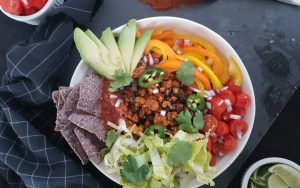
Fiesta Tempeh Taco Bowl
RB: So you mentioned tofu – the question I have is tofu is made out of soy, is that bad for women? There is a lot of controversy on this.
LP: It is not. There is a lot of controversy about soy. Soy can actually contribute to decreasing risk of cancer. I would say for soy, go for organic because it can be a more sprayed crop. There are a lot of antioxidants in tofu, it has been linked to lowering cholesterol, so there are a lot of health promoting benefits in soy. Like anything else you don’t want to overdo it and have soy milk and tofu and soy beans every day, but in balance it can definitely be a part of healthy diet. Just like anything else, going for the less refined versions is a good choice. Try edamame beans for a snack or tempeh is another good option – it’s similar to tofu but a bit more nutrient dense with higher protein and fiber.
Stay tuned for part II of our interview with Lindsay where we will learn what the deal is with super-foods, what her go-to recipes are, her favorite healthy restaurants here in Vancouver, how much water should you actually be drinking, and much more!
Find out more about Lindsay’s services, meal plans, and recipes at lindsaypleskot.com and make sure to follow her on Instagram (@lindsaypleskotrd) for daily healthy eating inspo!
NOW – the moment you’ve all been waiting for… Let’s get to know Lindsay personally! Check out the video clip below and see her answers to our random questions. And as a bonus, she’s going to show us how to quickly make a delicious healthy breakfast!
No Title
No Description
